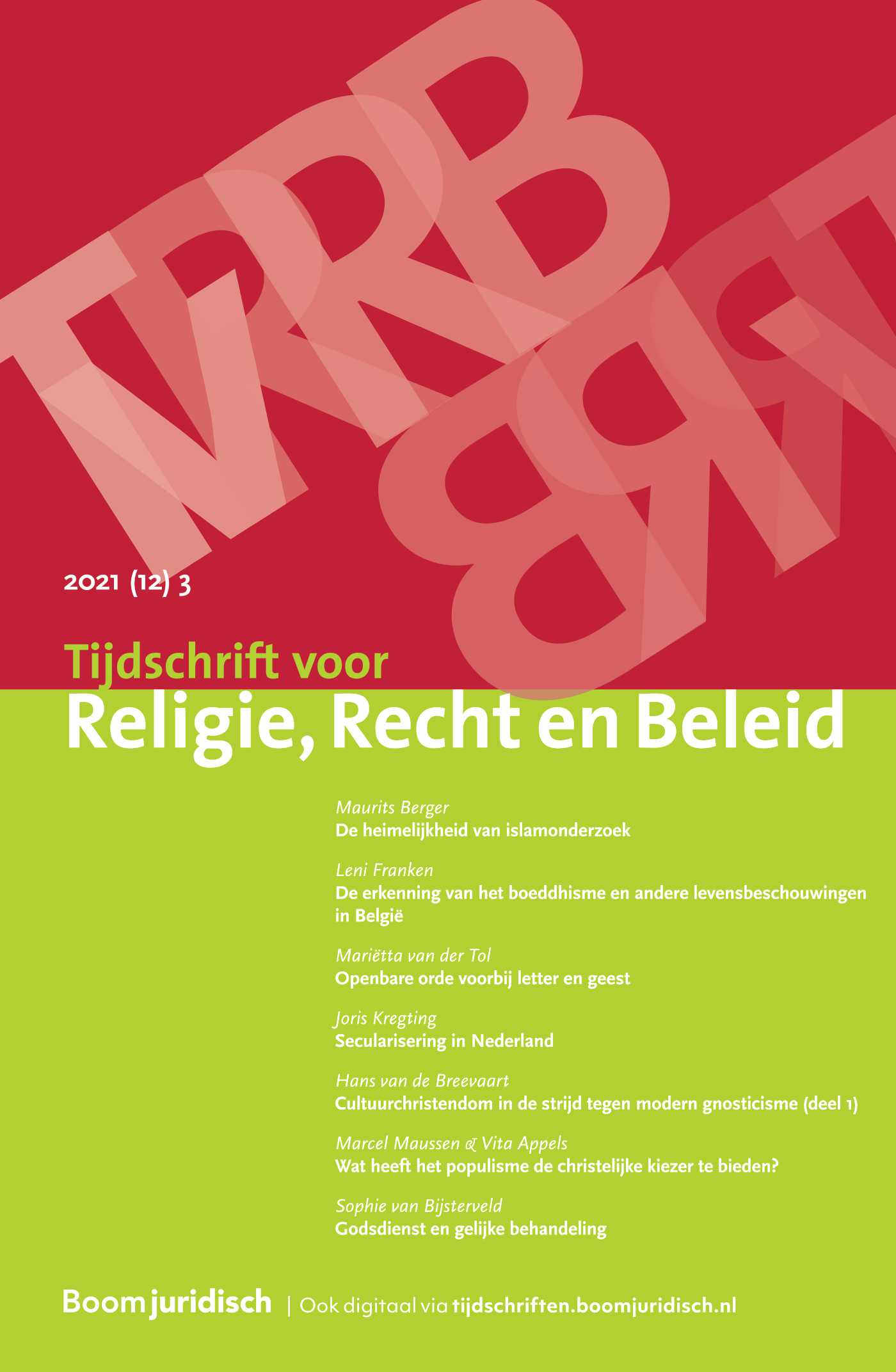|
This article investigates the role of ‘implicit religion’ in extremism, including those forms that do not explicitly call upon formal religion. Extremist quasi-religious narratives expose an exclusionary logic, which is mirrored by radical ways of thinking about counter-extremism. This unfailingly leads to more polarization. Extremism can only be countered by radical openness. Resilient democracy requires that citizens, politicians and professionals are willing and able to maintain open hearts and minds. Implicit religion can support this. Spiritual counselors and scientists of religion need to support the creation of spiritual narratives and rituals that strengthen democratic resilience. |


Tijdschrift voor Religie, Recht en Beleid
Meer op het gebied van Algemeen
Over dit tijdschriftMeld u zich hier aan voor de attendering op dit tijdschrift zodat u direct een mail ontvangt als er een nieuw digitaal nummer is verschenen en u de artikelen online kunt lezen.
| Overwegende ... |
De Heiligdomsvaart en de burgemeester |
| Auteurs | Dr. Ben Koolen |
| Auteursinformatie |
| Artikel |
|
| Trefwoorden | extremisme, radicalisering, democratie, impliciete religie |
| Auteurs | Drs. Saskia Tempelman |
| SamenvattingAuteursinformatie |
| Artikel |
Islam, politiek en burgerschap: hoe verhouden die zich tot elkaar? |
| Trefwoorden | politiek, politieke ideologie; politieke islam, religie, salafisme, modernisme |
| Auteurs | Dr. Roel Meijer |
| SamenvattingAuteursinformatie |
|
This article analyses the relation between Islam, politics and citizenship. It analyses three currents within Islam: Salafism, Islamism, and modernism. The central argument is that most modern Islamic currents do not have a concept of politics as an independent ‘field’ where compromises can be made concerning societal problems. The only current that provide the space for a pluriform, open political debate is Islamic modernism. Through its humanism and the centrality of the common good and not the text, modernism embraces not only the concept of politics as free space but also the concept of active citizenship. |
| Artikel |
Islam en mensenrechten: gaat dat nog lukken? |
| Trefwoorden | sharia, mensenrechten, islam en mensenrechten, minimale mensenrechten, Islamitisch recht |
| Auteurs | Prof. dr. mr. Maurits Berger |
| SamenvattingAuteursinformatie |
|
The question central to this article is whether ‘Islam’ and human rights are compatible and, if not, whether there might be room to come to a minimum standard of human rights that can be shared globally. This article will demonstrate that, from the perspective of Islamic orthodoxy, principles that are fundamental to human rights, like equality and freedom of religion, pose unsurmountable problems, and the adjustment of these principles is theologically nearly impossible. However, a growing number of Muslim intellectuals holds the opposite view, using new theological methods to argue that these Islamic principles and human rights are compatible. Although they are warmly welcomed by human rights lawyers and activists, their methods are not uncontroversial, and they are still very small in number. |
| Artikel |
Meer ruimte voor nieuwe scholen? |
| Trefwoorden | Vrijheid van onderwijs, artikel 23 Grondwet, schoolstichting, burgerschap, richtingvrije planning |
| Auteurs | Mr. Stefan Philipsen |
| Auteursinformatie |
| Artikel |
Synodaliteit: nieuw elan in kerkelijk leiderschapEen kerkrechtelijke bijdrage aan de ontwikkeling van kerkelijk bestuur in het spoor van het Tweede Vaticaans Concilie |
| Trefwoorden | katholieke kerk, canoniek recht, synodaliteit, bestuursrecht, vernieuwing |
| Auteurs | Dr. Ad van der Helm |
| SamenvattingAuteursinformatie |
|
The article is a plea to reconsider the new impetus that the second Vatican council in the catholic church has brought about, and to give it shape in the ecclesiastical administration of the catholic church. After a period of strong renewal this movement seems to be evaporated in the Netherlands, whereas this council and the code of 1983 have a lot of opportunities to offer. On the basis of a number of concrete examples of administrative reforms that Pope Francis and some of the newly appointed bishops have realized, the author offers some concrete proposals. |
| Artikel |
Een geschonden ordeEen theologische reflectie op migratie en de christelijke identiteit van Europa |
| Trefwoorden | migratie, Europa, christelijke identiteit, theologie |
| Auteurs | Prof. Stephan van Erp |
| SamenvattingAuteursinformatie |
|
In this article, the author criticizes a variety of views on the Christian identity of Europe in current discussions on migration. Next, he presents his own view on Christian identity, which consists of belief in a God who becomes present in the brokenness of the life of all. Applied to the issue of migration, this leads to a view of identity which develops in the encounter with migration. Then, the author defends the universal message of the Christian faith, and shows how this messages is violated as long as the suffering of migrants lasts. Thus, he holds a plea for a divine order over against the supposed order of christian identity. |

